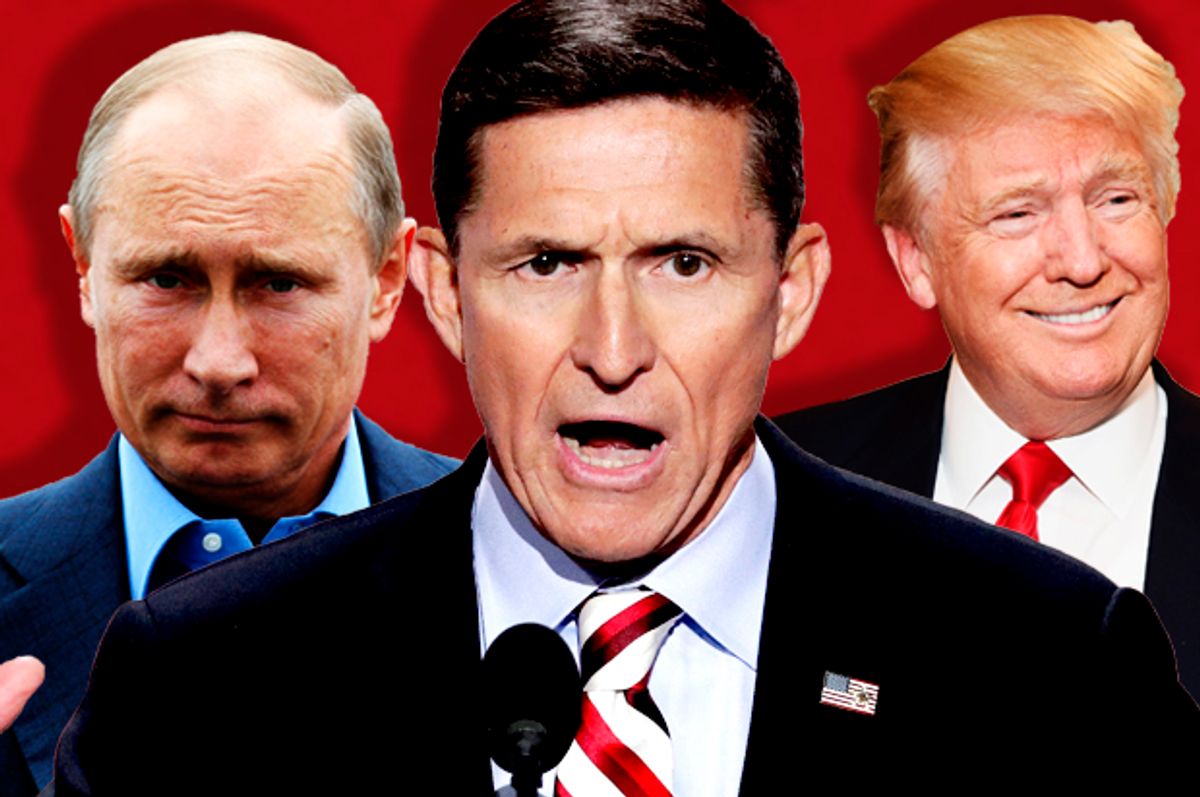On Monday evening, national security adviser Michael Flynn was forced to resign after supposedly losing the "trust" of President Donald Trump by failing to adequately and fully explain his phone conversations with Russian officials during the 2016 presidential election.
As The New York Times explained on Wednesday, FBI agents apparently concluded that Flynn had not been "entirely forthcoming" in describing a phone call he had with Sergey Kislyak, the Russian ambassador to the United States. That set in motion "a chain of events that cost Mr. Flynn his job and thrust Mr. Trump's fledgling administration into a fresh crisis."
As the Times report elaborated, Trump "took his time" deciding what to do about Flynn's dishonesty and was none too eager to fire him.
But other aides [such as other than press secretary Sean Spicer] privately said that Mr. Trump, while annoyed at Mr. Flynn, might not have pushed him out had the situation not attracted such attention from the news media. Instead, according to three people close to Mr. Trump, the president made the decision to cast aside Mr. Flynn in a flash, the catalyst being a news alert of a coming article about the matter.
“Yeah, it’s time,” Mr. Trump told one of his advisers.
Flynn is not alone. Other Trump operatives are also under investigation by the FBI for potentially illegal contact with senior Russian intelligence operatives.
This information is not new. The New York Times and other American news media outlets were aware of reports about Russian tampering in the 2016 election as well as an ongoing federal investigation of Trump, his advisers and other representatives. Instead of sharing this information with the American people during the election campaign, the Times and other publications chose to exercise "restraint" and "caution." Decades of bullying by the right-wing media and movement conservatives would pay great dividends.
Afraid of showing any so-called liberal bias, the corporate news media demonstrated little restraint in its obsessive reporting about the nonstory that was Hillary Clinton's emails. This, in conjunction with other factors, almost certainly cost her the election.
In all, the Republican Party and its voters have abandoned their Cold War bona fides and their (somewhat exaggerated) reputation as die-hard enemies of Russia and the former Soviet Union. To borrow from the language of spy craft, it would seem that they have been "flipped" by Russian President Vladimir Putin.
Despite mounting evidence suggesting that Trump's administration has been compromised by Russia, his public continues to back him. The Republican Party and its leadership have largely chosen to support Trump in a type of political suicide mission because they see him as an opportunity to force their agenda on the American people and reverse or undo by the social progress made by the New Deal, the civil rights movement, feminism, the LGBT movement and other forces of progressive change.
In the midst of these not so new "revelations" about Michael Flynn and other members of Trump's inner circle, the news media is now fixated on the Nixonian question: "What did the president know and when did he know it?" This question ought to not be treated like a mystery. The answer should be readily apparent because it is a direct reflection of Trump's political and personal values.
Trump has repeatedly shown that he is a fascist authoritarian who admires political strongmen and autocrats such as Putin. In keeping with that leadership style, Trump has surrounded himself with family members and other advisers so as to insulate himself from criticism — and also to neuter any political rivals. In violation of the emoluments clause of the Constitution, Trump is also using the office of the presidency to personally enrich himself, his family members and other members of his inner circle, such as Secretary of State Rex Tillerson. Donald Trump also has a longtime pattern of open admiration for gangsters and organized crime.
In sum, Trump's presidency has many of the traits of a criminal enterprise and a financial shakedown operation, masquerading as a democratically elected government.
Flynn resigned because he got caught, not because of what he did. White House press secretary Sean Spicer confirmed this with his statement during Tuesday's press briefing that Flynn did "nothing wrong or inappropriate." In response to this most recent scandal, Trump and his surrogates are now trying to focus on "the leaks," rather than the potential crimes that may have been committed. Like most political strongmen, Trump values secrecy and loyalty above all else. Those things must be maintained at all costs, even if that means that a given member of the ruling cabal might occasionally have to fall on his or her own sword.
Based on the increasing evidence of communication between his inner circle and Russian operatives, it appears plausible that Trump either actively knew about Flynn's actions (and perhaps even directed them) or chose to look away while actively benefiting from them. Either choice should disqualify him from the presidency.
In an earlier essay for Salon, I argued that for a variety of reasons that Trump can be considered a traitor to the United States. By that standard, his voters and other supporters who do not denounce him are also traitors, and any Republican officials who continue to back Trump are traitors as well. Recent revelations about Flynn and the still unknown extent of contact between other Trump advisers and Russian agents serve to only reinforce the truth of my earlier claim.
Republicans and other conservatives behave as though they have a monopoly on patriotism and exclusive claims to being "real Americans." Now is the time for them to test that commitment. Do Republicans and other conservatives love power more than their country? I fear I know the answer. I ask the question in the hope that I am wrong.
[jwplayer file="http://media.salon.com/2017/02/2.14.17_Carrie_Kruscheva_PutinTrumpBook_HD.mp4" image="http://media.salon.com/2017/02/2.14.17_Carrie_Kruscheva_STILLvideo.png"][/jwplayer]

Shares